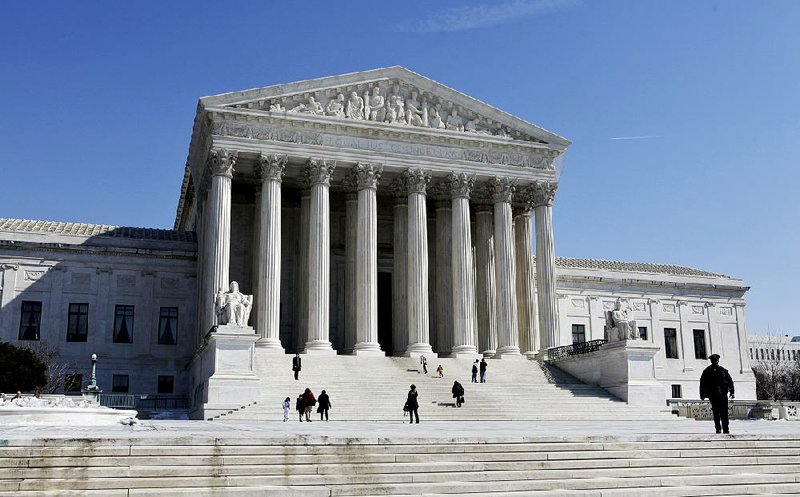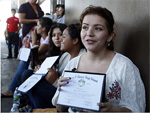WASHINGTON - The Supreme Court argued Monday over whether states fighting voter fraud and illegal immigration can make people document their U.S. citizenship before allowing them to use a federal voter-registration system that was designed to make it easier to vote.
Arizona and other states told the justices the precaution is needed to keep illegal aliens and other noncitizens from voting. But some justices asked whether states have the right to force people to document their citizenship when Congress ordered the states to accept and use federal “motor voter” registration cards that only ask registrants to swear on paper that they are U.S. citizens.
“I have a real big disconnect with how you can be saying you’re accepting and using, when you’re not registering people when they use it the way the federal law permits them to,” Justice Sonia Sotomayor said to Arizona Attorney General Thomas Horne.
Horne said, “It is the burden of the states to determine the eligibility of the voters.”
This is the second voting-eligibility issue the high court is tackling this session. Last month, several justices voiced deep skepticism about whether a section of the Voting Rights Act of 1965, a law that has helped millions of members of minority groups exercise their right to vote, especially in areas of the Deep South, was still needed.
The court will make decisions in both later this year.
In Monday’s case, the court is deciding the legality of Arizona’s requirement that prospective voters document their U.S. citizenship in order to use a registration form produced under the federal “motor voter” registration law. The 9th U.S. Circuit Court of Appeals said that that 1993 National Voter Registration Act, which doesn’t require such documentation, trumps Arizona’s Proposition 200 passed in 2004.
Arizona appealed that decision to the Supreme Court.
The case focuses on Arizona, which has tangled frequently with the federal government over immigration issues involving the Mexican border. But it has broader implications because four other states - Alabama, Georgia, Kansas and Tennessee - have similar requirements, and 12 other states are contemplating such legislation.
The federal “motor voter” law, enacted in 1993 to expand voter registration, requires states to offer voter registration when a resident applies for a driver’s license or certain benefits. Another provision of that law - the one at issue before the court - requires states to allow would be voters to fill out mail-in registration cards and swear they are citizens, under penalty of perjury, but it doesn’t require them to show proof. Under Proposition 200, Arizona officials require an Arizona driver’s license issued after 1996, a U.S. birth certificate, a passport or other similar document, or the state will reject the federal registration application form.
Justice Antonin Scalia seemed to think that a sworn statement wasn’t enough proof to allow people to register to vote. “If you’re willing to violate the voting laws, I suppose you’re willing to violate the perjury laws,” he said.
But lawyer Patricia Millett, representing those challenging the law, answered that courts accept sworn statements as proof in criminal cases, some of which end in executions. Congress decided that a sworn statement with the risk of perjury was sufficient to register to vote in the federal system, she said. “This is not just a ticket into the state’s own registration process so they can go, ‘Thank you very much, [throw] it in the garbage can, now do what we would like you to do.’ It is a registration form,” Millett said.
The Arizona requirement applies only to people who seek to register using the federal mail-in form. The state has its own form and an online system for registering to vote when renewing a driver’s license. The appeals court ruling did not affect proof of citizenship requirements using the state forms.
Justice Samuel Alito Jr. inquired whether state election officials would be free to ask a youth who was plainly too young to vote for proof of his age when he submitted an otherwise unobjectionable federal form in person. Millett said no, though she added that officials remained free to gather their own evidence “including from their own eyeballs.” The question in the case, she said, was whether the state could place the burden of proof on the applicants.
Alito also noted that people seeking to register to vote in Arizona need not use the federal form and might choose to use a more demanding state one instead.
“This seems to me like a crazy system,” he said. “This is like the IRS creating two different tax returns with different tax rates and different tax tables, and how much you pay would depend on which particular form you happened to pick up and submit.”
Opponents of Arizona’s law see it as an attack on vulnerable voter groups such as minorities and the elderly. They say they’ve counted more than 31,000 potentially legal voters in Arizona who easily could have registered before Proposition 200 but were blocked initially by the law in the 20 months after it passed in 2004. They say about 20 percent of those thwarted were Hispanic.
But Arizona officials say they should be able to pass laws to stop illegal aliens and other noncitizens from getting on their voting rolls. The Arizona voting law was part of a package that also denied some government benefits to illegal aliens and required Arizonans to show identification before voting.
Checks since last fall by The Associated Press showed that in Colorado, election officials found 441 noncitizens on the voter rolls out of nearly 3.5 million voters. Florida officials found 207, or 0.0018 percent of the state’s 11.4 million registered voters. In North Carolina, 79 people admitted to election officials that they weren’t citizens and were removed from the rolls, along with 331 others who didn’t respond to repeated inquires.
Justice Anthony Kennedy said that under Arizona’s interpretation, “it seems to me the federal form, as some of my colleagues have indicated, is not worth very much.”
Later, though, he said the appeals court had not given enough weight to Arizona’s concerns.
“The state has a very strong and vital interest in the integrity of its elections,” he said, “even when those, and perhaps especially when those, are elections of federal officials.”
Horne said the federal approach was insufficient to protect the integrity of federal elections in his state.
“It’s essentially an honor system,” he said of the statement required by the federal form. “It does not do the job.”
Horne said Arizona should be free to supplement the federal form even though the federal law required state officials to “accept and use” the federal form.
Horne compared the Arizona system to an airline sending out e-tickets instead of paper tickets but asking for identification before allowing passengers to board the airplane. “That would not contradict the statement that they are accepting and using e-tickets,” he said.
But Justice Elena Kagan didn’t accept that analogy, saying Arizona went further. “Wouldn’t it contradict it if instead of saying, ‘Well, we’d like you to offer identification,’ saying, ‘Well, we’d like you also to have a paper ticket’?” she said.
Arizona asked the federal government to add the state’s citizenship eligibility requirements to the federal form but was turned away. Scalia said the state should have sued to overturn that decision. “Why didn’t you do that?” said Scalia, who indicated that he would look favorably on such a challenge.
The decision not to challenge was his predecessor’s, Horne said.
The case is 12-71, Arizona v. Inter Tribal Council of Arizona, Inc.
Separately, a Minnesota woman at the center of a long-running court fight over the unauthorized downloading of copyrighted music said there’s still no way she can pay record companies the $222,000 judgment she owes after the U.S. Supreme Court declined to hear her appeal Monday.
The justices did not comment on their decision. Attorneys for Jammie Thomas-Rasset of Brainerd argued the amount was excessive.
The industry initially sued Thomas-Rasset in 2006. Since then, her case has gone through three trials and several appeals. The industry presented evidence that Thomas-Rasset made available over 1,700 songs to other computer users via the file-sharing service Kazaa, though the lawsuit targeted only 24 songs.
“I’m assuming that since they declined to hear the case, it’s probably done at this point,” she said. But she also said she needed to consult with her attorneys to determine what happens next.
Thomas-Rasset, 35, who works for the Mille Lacs Band of Ojibwe tribal government, maintained - as she has all along - that she can’t afford to pay.
“There’s no way that they can collect,” she said. “Right now, I get energy assistance because I have four kids. It’s just the one income. My husband isn’t working. It’s not possible for them to collect even if they wanted to. I have no assets.”
The Recording Industry Association of America offered to settle for $5,000 when it first sued, and offered to settle for a $25,000 donation to a charity for music industry people in need after her second trial. She refused both times.
“We appreciate the Court’s decision and are pleased that the legal case is finally over,” the trade group said in a statement. “We’ve been willing to settle this case from day one and remain willing to do so.”
The case is Thomas-Rasset v. Capitol Records, 12-715.
Information for this article was contributed by Jesse J. Holland, Jacques Billeaud and Steve Karnowski of The Associated Press; and by Adam Liptak of The New York Times.
Front Section, Pages 1 on 03/19/2013


